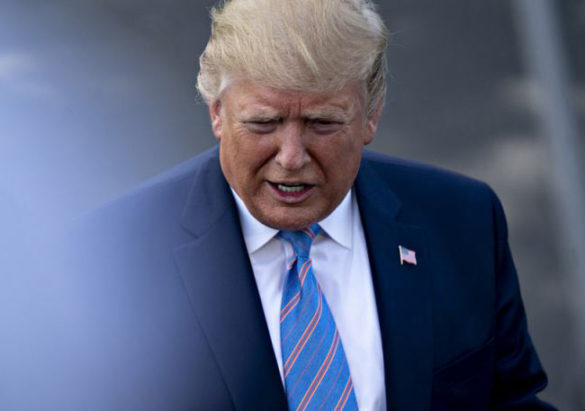
Trump Says He’s Poised to Escalate China Trade War Within Hours
President Donald Trump signaled he may escalate the trade war with China in the coming hours after the country’s latest round of tariffs, firing off a new demand that U.S. companies seek alternatives to producing goods in China.
“I will be responding to China’s Tariffs this afternoon. This is a GREAT opportunity for the United States,” Trump tweeted Friday, after China threatened to impose additional tariffs on $75 billion in American goods, including soybeans, cars and oil.
A meeting on trade took place around midday in the Oval Office, according to people familiar with the discussions. Trump is scheduled to leave late Friday for the G-7 summit in France, where trade tensions and their impact on the global economy are at the top of the agenda.
Trump added in a flurry of tweets that he “hereby ordered” American companies to start looking for alternatives to making products in China. It wasn’t immediately clear what legal authority the president would have to force such corporate decisions.
The president laced into China, saying “We don’t need China” and that the U.S. would be “better off without them.” He also took aim at the Federal Reserve over what he’s called its failure to lower interest rates to boost the economy and keep the dollar from becoming too strong, which weighs on exports.
U.S. stocks fell after Trump’s remarks, with the S&P 500 Index dropping 2.6% on the day. Technology stocks were hardest-hit. Treasuries rallied.
The angry set of tweets from Trump came after China announced its retaliation for new U.S. tariffs due to take effect Sept. 1 and Federal Reserve Chairman Jerome Powell repeated his concern that U.S. trade policy was contributing to a slowdown in both U.S. and global economies. They also reflected Trump’s growing frustration with the lack of progress in his trade battles with China, according to analysts close to the White House.
“The president has been increasingly frustrated in the last three months’’ with China after the May breakdown of talks that he believed were about to yield a deal, said Michael Pillsbury, a China expert with the Hudson Institute in Washington with whom Trump has consulted in the past.
QuickTake: How the U.S.-China Trade War Got to This Point
Trump’s most likely response, Pillsbury said, would be to raise tariffs from 10% to 25% on remaining imports from China that are due to start taking effect Sept 1. But he had other ways to increase pressure, Pillsbury added, including giving the final green light to sales of F-16s to Taiwan that have been signed off on by the State Department. The administration has notified Congress it intends to go ahead with the sale.
Derek Scissors, a China expert at the American Enterprise Institute who has also advised the administration, agreed that an increase in tariffs was the most likely course of action, though it could be staged to give China more time to respond.
Trump’s order to U.S. companies to abandon China would mean very little in the short-term, Scissors said. But the president does have other ways he could increase pressure on U.S. companies to stop doing business with China, particularly if he chose to invoke a national security emergency and ban tech companies from selling certain products to Chinese buyers.
“It’s worth the market being a little nervous that U.S. tech companies are involved with China and that they are providing China with dual-use technologies,’’ Scissors said. “That’s what the hawks are angry about. So the president can take action against those companies not by ‘I hereby order,’ but by starting a process where the direct pressure on them goes up.’’
China’s newest tariffs came earlier Friday in retaliation for Trump’s latest planned levies on Chinese imports, which have pushed U.S. stocks and commodities lower. The move takes aim at the heart of Trump’s political support — factories and farms across the Midwest and South at a time when the U.S. economy is showing signs of slowing.
Trump reiterated his criticism of the Fed after Powell’s remarks were released earlier Friday morning: “My only question is, who is our bigger enemy, Jay Powell or Chairman Xi?” Trump said in one of his tweets, referring to Chinese President Xi Jinping.
Source: https://finance.yahoo.com/news/trump-says-ll-respond-china-150756202.html